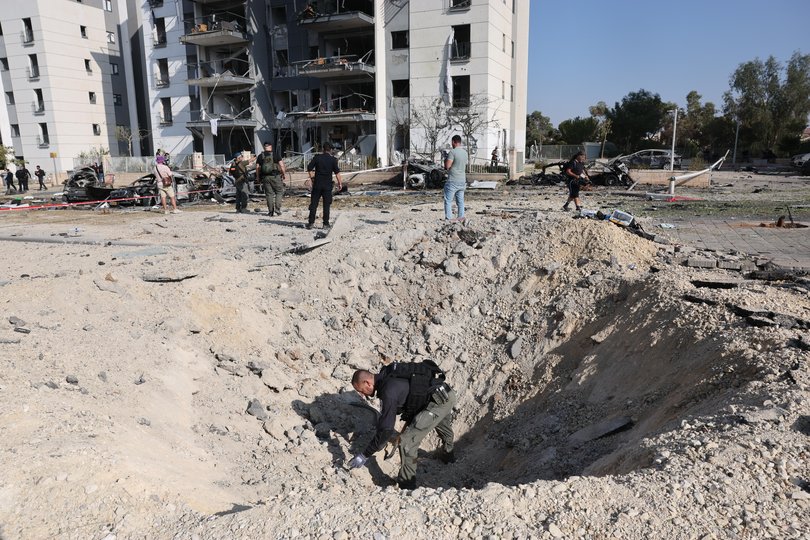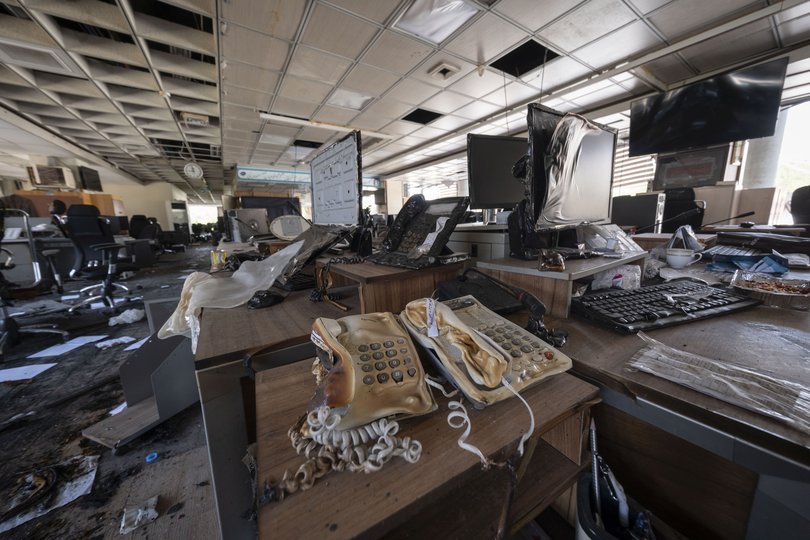Australia sends military planes to rescue citizens stranded in the Middle East
Australia has deployed military planes and personnel to the conflict-torn Middle East to rescue stranded citizens, after Donald Trump announced he would make a decision on US involvement ‘within two weeks’.
Australia has deployed military planes and personnel to the conflict-torn Middle East to rescue stranded citizens, after Donald Trump announced he would make a decision on US involvement “within two weeks”.
The US President’s slight reprieve has European foreign ministers hopeful they will be able to find a diplomatic exit ramp to the conflict when they meet with their Iranian counterpart in Geneva on Friday.
Bombings continued today with apartment buildings in southern Israel damaged and several cars set alight. Emergency services said only six people had been injured. It followed Israel’s Prime Minister Benjamin Netanyahu vow on Israeli TV s to hit all of Iran’s nuclear facilities.
Sign up to The Nightly's newsletters.
Get the first look at the digital newspaper, curated daily stories and breaking headlines delivered to your inbox.
By continuing you agree to our Terms and Privacy Policy.With neither Iran or Israel showing any signs of de-escalating, the Australian embassy in Tehran has been closed and its staff evacuated to neighbouring Azerbaijan. From there, officials will try and support the 2000 Australians and their family members still in Iran who want to leave.
A further 1200 Australians in Israel have registered for DFAT support, and the Government is hoping to continue to help the cohort leave for Jordan via bus, after evacuating about 80 people in the last two days.
Military aircraft and personnel are being moved to the Middle East to ensure that as soon as the skies reopen, those Australians can be moved.
ADF footage released today showed personnel loading pallets and boarding military planes at the RAAF Base Amberley in Queensland.
Australia’s ambassador to Iran, Ian McConville, will remain in the region and the Department of Foreign Affairs and Trade is deploying consular staff to Azerbaijan, including at its border crossing.
Foreign Minister Penny Wong said the Government had not made the decision to get diplomats and their families out of the country lightly.
“Generally we have a very volatile security situation in Iran. I am sure people ... know that we do not have to cast our minds back too far in history to understand the risk to foreign officials in Iran in times of unrest,” she said.
Senator Wong has emphasised those assets were not being moved for combat, and has downplayed suggestions Australia could become involved in any potential war.
“We are doing this as part of preparing contingency plans post the airspace becoming open. I also emphasise that we are sending defence assets to help Australians — they are not there for combat,” she said.
The ADF precautionary contingent includes two aircraft and personnel from the army and the airforce as part of Operation Beech.
Senator Wong overnight spoke to US Secretary of State Marco Rubio, and said the pair had “agreed to continue to work together closely to commit to a path of peace”.
“I emphasised that there is an opportunity … over the next two weeks for de-escalation, dialogue and diplomacy,” she said.
“That is what we want to see and that is what the world wants to see.
“Iran must come to the table and it must stop any nuclear weapons program.”
Hopes diplomacy could prevail have been somewhat reignited after the United States President gave himself more time to decide whether or not to involve America.
“Based on the fact that there’s a substantial chance of negotiations that may or may not take place with Iran in the near future, I will make my decision whether or not to go within the next two weeks,” he said in a statement early Friday morning AEST.
Iran has warned that US intervention could lead to “hell for the whole region”.
The Iranian Foreign Minister Abbas Araghchi is due to meet his British, French and German counterparts, as well as the European Union’s top diplomat in Geneva on Friday, where Tehran is set to be urged to return to the negotiating table.
British Foreign Secretary David Lammy, who met with Mr Rubio on Thursday, local time, said “a window now exists within the next two weeks to achieve a diplomatic solution”.
US state department spokesperson Tammy Bruce said the two top diplomats had agreed: “Iran can never develop or acquire a nuclear weapon”.
The US Secretary of State also spoke to French Foreign Minister Jean-Noël Barrot, of which Ms Bruce said the pair “agreed to continue to cooperate closely to ensure Iran never develops or acquires a nuclear weapon”.
Despite hopes the conflict could end through diplomacy, Israel and Iran have continued to trade strikes for the eighth straight day.
On Friday morning, local time, the Israeli military said it had struck military and industrial targets in and near Tehran overnight, including a major nuclear weapons research and development site.
Israel had deployed more than 60 Israeli fighter jets in the latest round of strikes, after Mr Netanyahu vowed to hit all of Iran’s nuclear sites.
The Israeli Defence Force said its jets had struck a site that produced missile components, another that produced raw materials used for casting rocket engines, and a research facility.

It has also claimed to have struck multiple Iranian missile systems in the Isfahan region in central Iran.
A US-based human rights group, Human Rights Activist, says the last week of strikes had killed 263 Iranian civilians.
Meanwhile, an Iranian missile attack caused fires and damage to buildings in Beersheba, in southern Israel, where at least seven people were injured.
It came a day after the city’s major hospital, the Soroka Medical Centre, was damaged in an Iranian attack.
Mr Netanyahu had earlier not ruled out targeting Iran’s Supreme Leader Ayatollah Ali Khamenei.
He said the Ayatollah “can no longer continue to exist”, and that “I instructed that no one in Iran should have immunity”.
Earlier this week, Mr Trump described Khamenei as an “easy target” for the US and Israel, and that assassinating the Ayatollah was still on the table.
Russia has warned any assassination would “open the Pandora’s box”, and any attempts to force Iranian regime change would be “unacceptable”.
Kremlin spokesman Dmitry Peskov told Sky News UK that Moscow would react “very negatively” if the Ayatollah was killed.
“The situation is extremely tense and is dangerous not only for the region but globally,” he said, in the Kremlin’s strongest comments since the Israel-Iran conflict broke out last Friday.
“An enlargement of the composition of the participants of the conflict is potentially even more dangerous.

“It will lead only to another circle of confrontation and escalation of tension in the region.”
Russia has deepened its ties with Iran in recent years, and said regime change was “unimaginable”.
“It should be unacceptable, even talking about that should be unacceptable for everyone,” Mr Peskov said, but would not be drawn on what action Moscow might take if the Ayatollah was killed.
Meanwhile, Israel’s Defence Minister threatened to “wipe out” Hezbollah if they joined Iran’s attacks.
“I suggest that the Lebanese proxy be careful and understand that Israel has lost patience with terrorists who threaten it,” Israel Katz wrote on X.
“If there will be terrorism, there will be no Hezbollah.”

